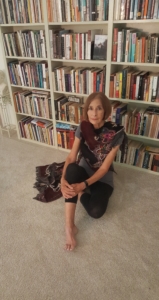Horizons
Once I wrote “The distance to the horizon is a fierce happiness,” and I believe it’s true. I had a good friend once who was a fine painter, and a series of paintings he did right before he retired from the art department inspired me so much that I wrote tiny stories about the characters in them. My friend made a fold-out book and exhibited it with the paintings. Later, when I wrote monologues in the voices of just the women, he jumped in and started making extra drawings. Now, he’d been fighting oral cancer for years and about this time he was approaching the end stages. I used to sit with him in his house—I remember he wore a mask because most of his face was gone, he said, he looked like a monster—and we’d talk about how things were going. Then one day he burst into tears and said “Lola, I’m so sorry. I’m not going to be able to finish our project”. To which I told him the truth: “Dear X, don’t worry. Everything we’ve been doing for all these months IS our project; it was never about finishing in the first place.” In other words, our project was the horizon.
Thinking of tears reminds me of a story about me and another artist. The artist in this one is the 18th century Japanese painter and print maker, Hokusai (1760-1849), whose pictures I’ve loved for my whole adult life but never appreciated properly until I saw an extensive exhibit of his work. I’d thought I preferred his depictions of country people to the views of Mt. Fuji he did late in his life—and I still do like those—but when I found myself in the same room as Mt Fuji, I started crying, that mountain moved me so much—the way he rendered it, it was everything.
After that, I started reading about Hokusai’s life, and what I found has made him a role model for the rest of mine.
…. The period, beginning in 1834, saw Hokusai working under the name “Gakyō Rōjin Manji” (The Old Man Mad About Art). It was at this time that Hokusai produced One Hundred Views of Mount Fuji…
In the postscript to this work, Hokusai writes: “From around the age of six, I had the habit of sketching from life. I became an artist, and from fifty on began producing works that won some reputation, but nothing I did before the age of seventy was worthy of attention. At seventy-three, I began to grasp the structures of birds and beasts, insects, and fish, and of the way plants grow. If I go on trying, I will surely understand them still better by the time I am eighty-six, so that by ninety I will have penetrated to their essential nature. At one hundred, I may well have a positively divine understanding of them, while at one hundred and thirty, forty, or more I will have reached the stage where every dot and every stroke I paint will be alive. May Heaven, that grants long life, give me the chance to prove that this is no lie.”
In 1839, a fire destroyed Hokusai’s studio, but he never stopped painting and completed Ducks in a Stream at the age of 87. He is said to have exclaimed on his deathbed, “If only Heaven will give me just another ten years… Just another five more years, then I could become a real painter.”
ABOUT LOLA: Lola Haskins’ poetry has appeared in The Atlantic, The London Review of Books, London Magazine, The New York Quarterly, Georgia Review, Prairie Schooner, Rattle and elsewhere, as well as having been broadcast on NPR and BBC radio. She has published fourteen collections of poems, a poetry advice book and a non-fiction book about fifteen Florida cemeteries. Ms. Haskins has been awarded three book prizes, two NEA fellowships, four Florida Cultural Affairs fellowships, the Emily Dickinson/Writer Magazine award from Poetry Society of America, and several prizes for narrative poetry. She retired from teaching Computer Science at the University of Florida in 2005 and served from then until 2015 on the faculty of Rainier Writers Workshop.
SEE LOLA LIVE AT CHARLOTTE LIT! Lola Haskins will read from and discuss her work at Charlotte Lit on Friday, November 5 at 6 p.m. Free! Advance registration required.


